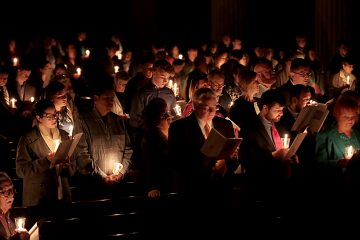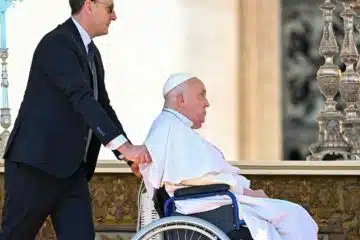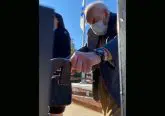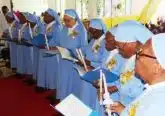Study on priest and religious student debt finds it can be a barrier to vocations
CNA Staff, Aug 1, 2024 / 08:00 am
A new study on student debt by a major Catholic research group, released today, sheds light on the challenges debt poses to prospective Catholic priests and religious as well as to U.S. dioceses and religious institutes.
The researchers found that a discerning person’s student debt can be a barrier to entry, as some candidates choose on their own not to continue with a vocation because of their debt, and in less frequent cases, a religious institute or diocese may ask the person to delay or rescind their candidacy due to high levels of student debt.
The study, conducted by the Center for Applied Research in the Apostolate (CARA) at Georgetown University and commissioned by the Labouré Society, was designed to measure the impact of educational debt on the men and women who inquire about and apply to religious life or seminary. In addition, the study looked at the policies and practices of religious institutes and dioceses regarding vocational inquirers and candidates with student debt.
John Flanagan, executive director of the Labouré Society, noted that canon law requires those entering religious life to be free from debts that they are unable to pay. He said among other things, the Labouré Society, which provides financial and spiritual support to those wishing to enter vocations, has observed those wishing to enter the priesthood or religious life waiting until later in life when they have finally paid off their debts.
“It’s hard to pay a debt when you take a vow of poverty,” Flanagan told EWTN News Nightly anchor Tracy Sabol. “For those entering into diocesan life, yes, they get a stipend, but for many that [debt] burden can be more than they can pay on that priestly stipend.”
Labouré says it has helped more than 400 individuals raise $11 million to help with their student debt over the past 20 years. Flanagan said the group has done this by seeking to invite other people into the vocations of those struggling with debt.
“It’s really about evangelization and invitation. We work with the aspirants to be able to help them share their story and invite people into it,” he said.
The study consisted of surveys mailed to 196 diocesan vocations directors and the vocation directors of 742 religious institutes of men and women. Among those responding, 185 major superiors and two diocesan vocation directors reported that the survey did not apply to them as they have not had candidates in the last five years. Ultimately, 42% of the diocesan vocations directors and 37% of religious institutes contacted were able to participate.
“The Labouré Society aims to use insight from this report to continue tailoring its program serving religious communities and dioceses nationwide,” the organization says.
Dioceses and archdioceses
The average number of priests among responding dioceses was 111, with an average of 18 seminarians in formation. Responding dioceses also said they are in contact with 306 serious discerners — about 35 per diocese — for the priesthood.
Overall, of those serious inquirers, nearly a quarter have student debt. That figure was not necessarily evenly distributed, however, as 4% of responding dioceses reported that more than three-quarters of their serious inquiries have student debt. A similar percentage of formal applicants to dioceses brought student debt with them.

Nine responding dioceses reported that 23 serious inquirers did not enter seminary because of their student debt, which accounts for 3% of the total number of serious inquirers with educational debt. In addition, a total of 17 responding dioceses asked 26 serious inquirers with educational debt to delay their application until they paid or reduced the debt.
Just two responding dioceses — among 56 responding — reported a total of two formal applicants who were turned away because of their educational debt.
Large dioceses were more likely than small dioceses to report that their serious inquirers were carrying debt. However, the average amount of debt brought to small dioceses far eclipsed the average amount brought to large dioceses. The average debt carried by a candidate for the priesthood at time of acceptance is $68,333 for small dioceses, $23,286 for medium dioceses, and $21,864 for large dioceses, the study found.
In terms of the policies governing the assumption of a seminarian’s student debt, more than half of responding dioceses said they have a written policy or accepted practices on educational debt. The most common way that dioceses handle educational debt is to ask candidates to defer their loans, with 85% saying they ask their candidates to do so. Half of responding dioceses said they take on candidates’ debt and pay it off over time.
More than 3 in 5 responding dioceses (63%) that assume educational debt do so after priestly ordination, while an additional 12% do so only after the candidate has entered his theology studies. Smaller dioceses are more likely to take on a candidate’s debt at the college seminary level than are large dioceses.
In terms of the most common ways of paying off the student debt, nearly 4 in 10 responding dioceses or their candidates have received funds from individual donors or patrons of the diocese, followed by the Knights of Columbus Fund for Vocations.
Nearly a fifth of dioceses said that the diocese has experienced financial strain due to the student debt of candidates or members.
Religious institutes of men and women
Responding institutes had an average of eight formal applicants since the beginning of 2018 — an average of 10 for each institute of men and seven for each institute of women. The number of applications ranged from 87 to zero, and half of all responding institutes reported having no more than six applicants since Jan. 1, 2018.
At least a fifth of religious institutes that responded said they have noticed an upward trend in the amount of student debt their inquirers are carrying, the study found. Those that responded said that on average, 1 in 4 serious inquirers in the past four years have brought student debt with them — more than $45,000 on average. Men brought with them an average of $39,685 in debt, and women brought an average of $48,555.
Among those who make a formal application, about 21% have student debt, with a $23,000 average.
Nearly half of institutes take on their applicants’ debt — a reported total of $2 million in the past five years — with religious institutes of women more likely than those of men to take it on. Most institutes have a limit to how much of a candidate’s debt they will take on, with an average of $30,000 for men and $10,000 for women.
Of those institutes that take on their candidates’ debt, a majority assume the debt and pay it off over time. Nearly half of institutes ask candidates who leave to reimburse the institute for student debt payments they’ve made. In addition, about half of those institutes take on the debt during a person’s candidacy, postulancy, or during novitiate, and half wait until a person’s temporary or perpetual profession. Some institutes only pay the interest on a candidate’s loans rather than the principal.
Eighteen responding institutes say they turned away 28 serious inquirers because of their educational debt, which accounts for 2% of the total number of serious inquirers with educational debt. A larger number of institutes reported asking candidates to delay their application until they paid or reduced the educational debt.
“This is higher than other students’ educational borrowing habits,” the study reads.
“In the 2020-2021 academic year, 37% of undergraduate students attending a public, four-year institution took out student loans averaging $7,500. In that same year, 53% of undergraduate students at private, not-for-profit institutions (including Roman Catholic colleges and universities) took out student loans averaging $8,800.”
This heavy burden of debt has caused a dampening effect on religious institutes. About 1 in 5 report that at least some serious inquirers have not pursued the application process because of their educational debt, a number slightly lower among formal applicants. One in 10 institutes have experienced financial strain due to the educational debt of candidates or members.
In terms of policies to address the issue of student debt, more than two-thirds of responding religious institutes have a written policy or an accepted practice on educational debt. Many make use of funds from the Knights of Columbus and the Labouré Society to help them pay off the debts.













